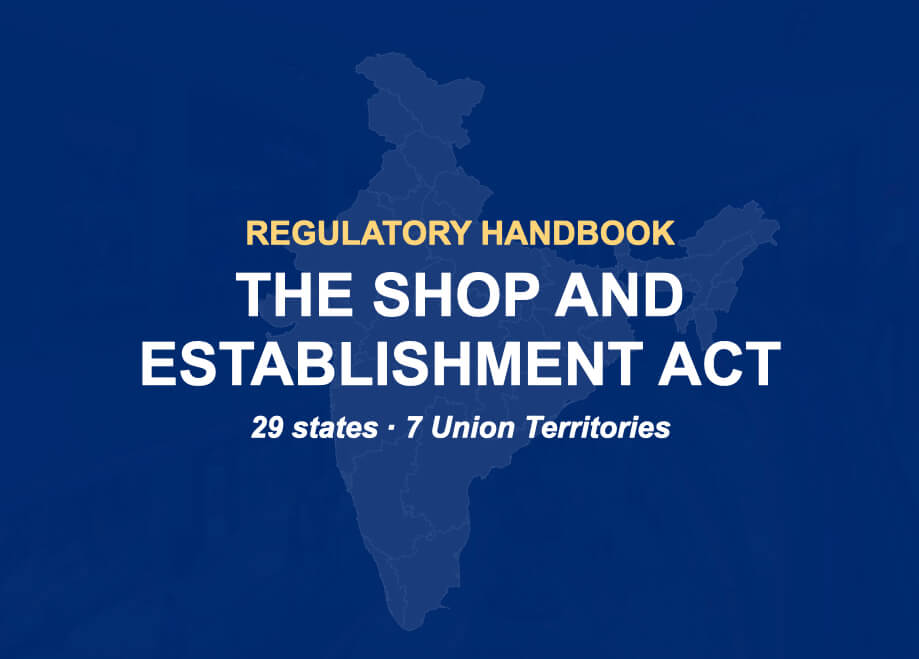
One of the important regulations to which most businesses in India are subject is the Shop and Establishment Act, enacted by every state in India. The Act is designed to regulate the payment of wages, hours of work, leave, holidays, terms of service and other work conditions of people employed in the shop and commercial establishments. In this article, we look at the salient features of the Shop and Establishment Act.
Shop and Establishment Act in India
The Shop and Establishment Act is regulated by the Department of Labor and regulates premises wherein any trade, business or profession is carried out. The act not only regulates the working of commercial establishments but also societies, charitable trusts, printing establishments, educational institutions run for gain and premises in which banking, insurance, stock or share brokerage. This act regulates areas such as working hours, rest intervals for employees, opening and closing hours, closed days, national and religious holidays, overtime work, rules for employment of children, annual leave, maternity leave, sickness and casual leave, etc.,
Premises Regulated by the Shop & Establishment Act
The Shop and Establishment Act in India is promulgated by the state and may slightly differ from state to state. However, as per the Act, all shops and commercial establishments operating within each state are covered by the respective Shop & Establishments Act. Shops are defined as premises where goods are sold either by retail or wholesale or where services are rendered to customers and include
- an office,
- a storeroom,
- a godown,
- a warehouse or workhouse or a workplace.
- Establishments are defined as shops, commercial establishments, residential hotels, restaurants, eating-house, theatres or other places of public amusement or entertainment.
- Further, establishments, as defined by the act, may also include such other establishments as defined by the Government by notification in the Official Gazette. However, factories are not covered by the Shops & establishments act and are regulated by the Factories Act, of 1948.
Aspects Regulated by the Shop and Establishment Act
The Shop and Establishment Act regulates some aspects relating to the operation of a shop or commercial establishment. Some of the key areas regulated by the Shop and establishment act include:
- Hours of work
- The interval for rest and meals
- Prohibition of employment of children
- Employment of young people or women
- Opening and closing hours
- Close days
- Weekly holidays
- Wages for holidays
- Time and conditions of payment of wages
- Deductions from wages
- Leave policy
- Dismissal
- Cleanliness
- Lighting and ventilation
- Precautions against fire
- Accidents
- Record keeping
Shop and Establishment Act License
Any shop or commercial establishment that commences operation must apply to the Chief Inspector for a Shop and Establishment Act License within the prescribed time. The application for a license in the prescribed form must contain
- The name of the employer,
- address of the establishment,
- name of the establishment,
- category of the establishment,
- number of employees and other relevant details as requested.
- On submission of the application and review by the Chief Inspector, the shop or commercial establishment will be registered and a registration certificate will be issued to the occupier. The registration certificate must be prominently displayed at the shop or commercial establishment and renewed periodically, as per the act.
In case the shop or establishment would like to close down the business, the occupier should notify the Chief Inspector in writing within fifteen days of the closing. The Chief Inspector after reviewing the request for closure can remove the shop or commercial establishment from the register and cancel the registration certificate.
Penalties under the Shop and Establishment Act
The Shop and Establishment Act is a state-specific legislation regulating employees’ working conditions in commercial establishments such as shops, offices, and other establishments. The act sets out several obligations for employers, including working hours, wages, leave policies, and other benefits, to ensure the welfare of employees. Failure to comply with the obligations can lead to penalties under the act. In this article, we will discuss the penalties that can be imposed for non-compliance with the Shop and Establishment Act in India. It is important to note that the penalties may vary depending on the state in which the business is located. The quantum of the penalty may also depend on the nature and severity of the offence.
The penalty amounts under the Shop and Establishment Act in India may vary depending on the state of the business and the nature of the violation. The quantum of the penalty may also depend on the severity of the offence.
Here are some general penalty amounts that businesses may face for non-compliance with the Shop and Establishment Act in India:
Fine for late registration
Employers who fail to register their establishments within the prescribed time limit may be liable to pay a fine. The fine amount for late registration can range from a hundred to a thousand rupees depending on the state.
Fine for non-maintenance of registers
Under the act, employers must maintain certain registers, such as
- attendance,
- wage,
- and leave registers.
- Failure to maintain these registers can lead to a penalty. The penalty for not maintaining the required registers can range from a hundred to a thousand.
Fine for non-compliance with working hour regulations
The act prescribes the maximum number of working hours for employees. Employers who fail to comply with the regulations may be liable to pay a fine. The fine amount may vary depending on the state in which the business is located.
Fine for non-compliance with leave policies
The act also prescribes the minimum number of leave days employees are entitled to. Employers who fail to comply with the regulations may be liable to pay a fine. The fine amount may vary depending on the state in which the business is located.
Fine for non-payment of wages
Employers are required to pay their employees within the prescribed time limit. Failure to do so can lead to a penalty. The fine amount may vary depending on the state in which the business is located.
Cancellation of registration
In extreme cases of non-compliance, the registration of the establishment may be cancelled. This can result in the closure of the business.
In conclusion, the Shop and Establishment Act sets out several obligations for employers to ensure the welfare of employees. Non-compliance with these obligations can lead to penalties, including fines, registration cancellation, and business closure. Employers need to comply with the regulations prescribed under the act to avoid penalties and ensure the welfare of their employees for specific details.
Requirements to obtain the Shop and Establishment Act Registration
Shop and Establishment Act registration is mandatory for businesses operating in India. The registration process and requirements may vary depending on the state where the company is located. This article will discuss the general requirements to obtain the Shop and Establishment Act registration in India.
Shop and Establishment Act
The Shop and Establishment Act is a state-specific legislation regulating employees’ working conditions in commercial establishments, such as shops, offices, and other commercial establishments. The primary objective of this act is to provide better working conditions and regulate the terms of employment, such as working hours, wages, leave policies, and other benefits.
Eligible businesses under the Shops and Establishments Act
Here are the eligible businesses under the Shops and Establishments Act in India:
- Any shop or retail store, including a showroom, a warehouse, or a godown
- Any commercial establishment, such as an office, a bank, a hotel, a restaurant, a theatre, a cinema hall, a club, or an amusement park,
- Residential hotels and lodges that provide lodging facilities to guests or tourists
- Educational institutions, such as colleges, schools, coaching centres, and other training centres,
- Medical establishments, such as hospitals, clinics, and dispensaries
- Any other establishment, such as a factory, a workshop, a canteen, a place of entertainment, a beauty parlour, or a laundry
It is important to note that the Shops and Establishments Act may have different definitions and coverage in each state in India. Hence, businesses are advised to check with the respective state’s Shops and Establishments department to confirm the eligibility of their business under the act.
Here are the general requirements to obtain the Shop and Establishment Act registration in India:
- Business Details: The business owner needs to provide details such as name, type of business, address, and nature of business.
- Proof of Address: The business owner must provide the address of the business premises, such as a rental agreement, lease deed, or ownership document.
- Proof of Identity: The business owner must provide proof of identity such as an Aadhaar Card, Voter ID, PAN Card, or Passport.
- Number of Employees: The business owner must provide the number of employees working on the premises.
- Bank Account Details: The business owner needs to provide the bank account details.
- Other Documents: Some states may require additional documents, such as a NOC (No Objection Certificate) from the local municipality, fire department, or pollution control board.
Apart from these documents, the business owner may also need to submit some additional documents, such as:
- Registration Form: The business owner needs to fill out the registration form provided by the concerned department of the state.
- Photographs: The business owner may need to submit passport-sized photographs of the business owner and the employees.
- Signature: The business owner must sign the registration form and other related documents.
- Fees: The business owner needs to pay the registration fees per the state’s rules.
The Shop and Establishment Act registration process may vary depending on the state in which the business is located. In some states, companies can apply for registration online; in others, they may have to submit physical documents to the concerned department.
Once the application is submitted, the concerned authority will verify the details and documents provided by the business owner. The registration certificate will be issued to the business owner upon successful verification.
In conclusion, obtaining the Shop and Establishment Act registration is mandatory for businesses operating in India. It is advisable to check with the respective state’s Shop and Establishment Act department for specific requirements and procedures for obtaining registration.
Financial and Business expert having 30+ Years of vast experience in running successful businesses and managing finance.





